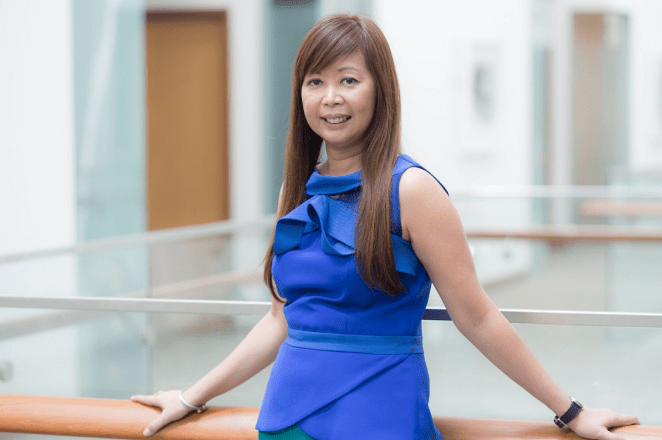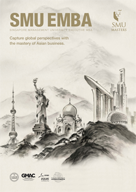
As a senior private banker at Credit Suisse in Singapore, Mary Ann Gabriel serves some of Asia’s wealthiest entrepreneurs.
“Many of my clients are self-made. They might have started by opening a tiny shop in the Philippines in the 1970s and now they’ve built up businesses and become billionaires,” says Gabriel, who’s worked at Credit Suisse for more than five years and has around 21 years’ banking experience in total.
Despite knowing her clients inside out, Gabriel says she’s constantly exploring ways to enhance her customer service techniques and advance her career.
In 2016, Gabriel took a leap of faith and enrolled in the Singapore Management University Executive MBA (SMU EMBA).
“Some of my friends told me I didn’t need the degree because I had a successful career, but I knew it would help me perform better,” she says. “I chose SMU for the flexibility of its course structure, and the accessibility of its campus to my office.”
Gabriel started the 12-month part-time EMBA programme in May last year, and she says the skills she’s learning at SMU are already improving the way she works.
“When you’re a relationship manager dealing with ultra-high-net-worth clients, you must have charisma and be personable, but you also need to understand your clients’ businesses,” says Gabriel, who was promoted to director level in December. “I’m enrolled in one of Asia’s best management schools, which is a clear sign that I’m serious about business. My clients respect the effort I’m making.”
“The SMU EMBA is helping me advise them better – not just about their personal investments, but about their Asian business ventures, whether that’s opening a factory in Myanmar or outsourcing operations to India,” adds Gabriel.
SMU’s Asia-centric EMBA programme is particularly relevant for finance professionals who work with clients in the region, she says.
For example, the school’s Centre of Management Practice produces case studies focused on Asian companies, which complement its lessons on Western corporations.
“I initially thought the case studies would all be about successes. But I’ve learnt just as much by studying failures – knowing how strategy and culture can make a company too inflexible,” says Gabriel.
“The case studies help me better understand my clients’ strategies and how they’ve overcome failures,” she adds. “As a banker, it’s great to have the opportunity to step back and discuss the pros and cons of business issues within the walls of a classroom.”
The SMU EMBA isn’t just helping Gabriel with her clients, it’s also impacting her management and teamworking skills.
She says she particularly enjoyed taking part in the ‘Leading in a Global Environment’ module.
“It helps you to better appreciate the points of view of the people you’re managing and to lead your team to a clear end goal,” says Gabriel. “This is vital in the private banking sector, because we need to groom the next generation of relationship managers.”
“The module has also made me more aware about how to spot risks in my team and how to monitor everyone’s progress,” she adds. “And because the degree is part-time, I’m able to apply what I’m learning straight away.”
The course on ‘Negotiation and Conflict Resolution’ is another highlight of the SMU EMBA, says Gabriel.
“We were given a business case, put into groups, and then we played different roles – buyers and sellers, for example,” she explains. “Afterwards, the Professor showed us how to improve – how to become more strategic and less emotional in business negotiations.”
Alongside SMU’s Singapore-based modules, all EMBA students travel abroad for one-week stints at three leading universities: The Wharton School in Philadelphia, the Indian School of Business in Hyderabad, and Peking University in Beijing.
“These trips were both beneficial and challenging – they pushed me out of my comfort zone and exposed me to new ways of doing business,” says Gabriel.
“At Wharton, for example, there were very intensive case studies, lots of debates among my classmates, and great insights into how managers makes decisions. At Peking University, we learnt about Chinese history and culture, and visited companies in sectors ranging from manufacturing to technology.”
Gabriel believes one of the keys to success during the SMU EMBA is to adopt a “never-give-up” attitude.
“You’re working and studying at the same time, so you need to be determined and have a passion for what you’re learning. Even more importantly, your family and your employer need to be supportive. I’ve been lucky in both these regards, and my clients are interested in my EMBA too – some are even asking me about my grades.”
This article was orginally published on eFinancialCareers.
Speak to our Admissions Advisors
Lee Kong Chian School of Business
Postgraduate Admissions
Singapore Management University,
SMU Administration Building
81 Victoria Street, Singapore 188065
Tel: +65 6828 0882
Join us at the upcoming events
Ofukacho, 1−1 ヨドバシ梅田タワ
Osaka, Kita Ward, 〒530-0011, Japan
Kyobashi, 1 Chome−3−5 三井ガーデンホテル 1F
Chuo City, Tokyo, 〒104-0031, Japan
